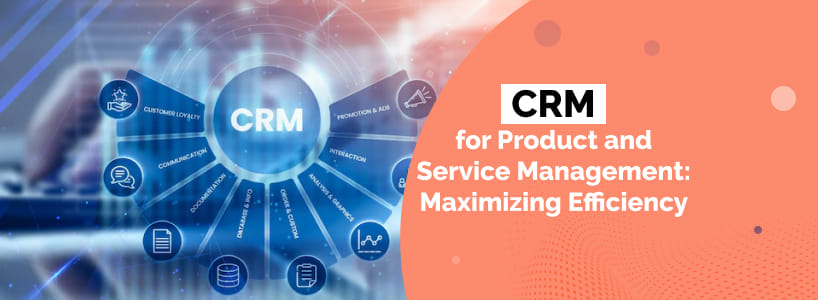CRM for Product and Service Management: Maximizing Efficiency

In todays highly competitive market, customers expect quick responses, consistent service, and seamless experiences across every touchpoint. Businesses dealing with products or services must therefore adopt systems that streamline operations and improve customer satisfaction. This is where Customer Relationship Management (CRM) comes into play.
A well-implemented CRM system does far more than store contact information. It centralizes data from sales, marketing, support, and operations, giving your team a 360-degree view of your customers and products. For companies managing both tangible products and service-based offerings, a CRM acts as a single source of truth for all transactions, service requests, and feedback.
Why CRM is Crucial for Product and Service Management
Managing products involves tracking inventory, pricing, supplier details, and customer purchase history. Service management, on the other hand, requires monitoring service requests, scheduling, and ensuring timely delivery. Without a centralized platform, these processes often become disjointed, leading to delays and miscommunication.
A robust CRM software for product and service management integrates all these functions. Teams can instantly access updated product information, view customer interactions, and resolve issues faster. This not only improves internal coordination but also enhances the customer experience.
Key Benefits of Using CRM for Product & Service Management
- Centralized Data: All product details, service records, and customer communications stay in one place. This eliminates the need for multiple spreadsheets or disconnected tools.
- Improved Collaboration: Sales, support, and operations teams work together seamlessly with real-time access to the same information.
- Faster Response Times: By automating routine tasks and notifications, your team can respond to customer queries or service issues more quickly.
- Data-Driven Decisions: Built-in analytics and reporting features allow you to identify your top-selling products, most requested services, and potential improvement areas.
- Customer Satisfaction: Quick issue resolution, personalized communication, and consistent follow-ups help strengthen customer trust and loyalty.
How CRM Enhances Efficiency
Efficiency isnt just about doing things fasterits about reducing errors, minimizing manual work, and using resources wisely. For example, when a CRM automatically syncs product updates across all departments, your support team always has the correct information, reducing repeat calls and confusion. Similarly, automated service scheduling and reminders ensure technicians or service staff never miss appointments.
Many businesses today also choose cloud-based CRM solutions because they are accessible anywhere, scalable as your business grows, and come with enhanced security features. This flexibility is especially useful for teams working remotely or in multiple locations.
Final Thoughts
Adopting a CRM system designed for product and service management is no longer optionalits essential. By centralizing data, improving coordination, and automating tasks, you can maximize efficiency and deliver better customer experiences. Whether you run a retail business, a service agency, or a hybrid model, a CRM will help you stay ahead of competitors and build long-lasting customer relationships.
Add a Comment
Your email address will not be published. Required fields are marked *
Categories
Popular Posts
![Customer, Lead, or Deal? Understanding CRM Sections for Smarter Sales [thumb]](https://blogimages.weblink.in/customer-lead-or-deal-understanding-crm-sections-for-smarter-sales-350x128.jpg)
Customer, Lead, or Deal? Understanding CRM Sections for Smarter Sales
![How EduAutomate Brings Real-Time Visibility to All Admin Operations? [thumb]](https://blogimages.weblink.in/how-eduautomate-brings-real-time-visibility-to-all-admin-operations-350x128.jpg)
How EduAutomate Brings Real-Time Visibility to All Admin Operations?
![How CRM Vendor Management Enhances Your Procurement Process [thumb]](https://blogimages.weblink.in/how-crm-vendor-management-enhances-your-procurement-process-350x128.jpg)